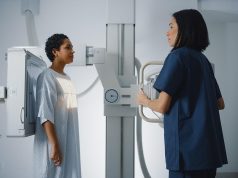Women should be encouraged to optimize lifestyle and should not be treated with hormone therapy
TUESDAY, Aug. 29, 2017 (HealthDay News) — Many non-hormone options and therapies are available for the treatment of estrogen-depletion symptoms in breast cancer survivors, and individualized treatment is important, according to a review published online Aug. 2 in the Journal of Clinical Endocrinology & Metabolism.
Richard J. Santen, M.D., from the University of Virginia Health System in Charlottesville, and colleagues conducted a systematic review of the evidence and made recommendations relating to symptoms and clinical problems associated with estrogen depletion that affect an estimated 9.3 million breast cancer survivors globally.
The researchers recommend that women should not generally be treated with menopausal hormone therapy or tibolone following breast cancer, but should optimize lifestyle. Mind-brain-behavior or non-hormone, pharmacologic therapy may be beneficial for women with moderate-to-severe symptoms. Beneficial effects on vasomotor symptoms and quality of life were reported with selective serotonin/noradrenaline reuptake inhibitors and gabapentenoid agents. A range of nonhormonal agents are available for osteoporosis, while treatment of vulvovaginal atrophy remains an unmet need. Low-dose vaginal estrogen is absorbed in small amounts and could potentially stimulate occult breast cancer cells; this is generally not advised, especially for those on aromatase inhibitors. Lasofoxifene, neurokinin B inhibitors, stellate ganglion blockade, vaginal testosterone, and estetrol are therapies undergoing development for possible future use.
“A variety of non-hormone options and therapies are available for treatment of estrogen-depletion symptoms and clinical problems after a diagnosis of breast cancer,” the authors write. “Individualization of treatment is essential.”
Several authors disclosed financial ties to the biopharmaceutical industry.
Copyright © 2017 HealthDay. All rights reserved.








